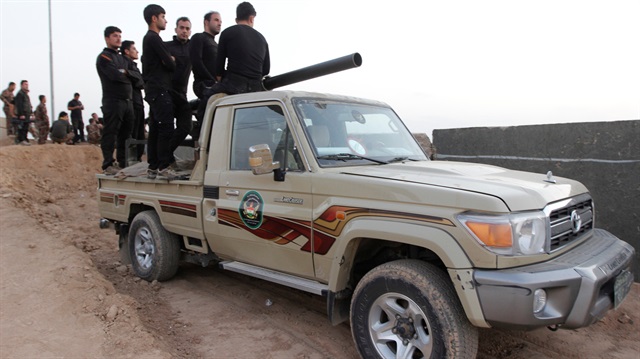
Peshmerga commanders accuse ‘foreign powers’ of supporting Baghdad’s alleged ‘military buildup’ in N. Iraq
Peshmerga forces loyal to northern Iraq’s Kurdish Regional Government (KRG) have staged a tactical withdrawal from all “contact areas” in northern Iraq, a KRG minister said Friday.
At a press conference held in the northern city of Kirkuk, KRG Minister for Peshmerga Affairs Jafar Mustafa Ali said Peshmerga forces were “under pressure” from the Iraqi army to withdraw from strategic parts of city.
“Following the deployment of Iraqi troops to the town of Tuz Khurmatu [located roughly 90 kilometers south of Kirkuk], Hashd al-Shaabi fighters had hoped to attack Peshmerga forces deployed in the area,” Ali said.
“But we used every means available to avoid a conflict,” he added.
The Hashd al-Shaabi is a largely Shia fighting force that was officially incorporated into the Iraqi army last year.
According to Ali, Hashd al-Shaabi commanders were pressuring Peshmerga fighters to withdraw from oil wells and military bases in Kirkuk and from the city’s primary airport.
Yet despite these pressures, he said, Peshmerga forces had maintained their positions while avoiding any contact with Hashd al-Shaabi fighters deployed in the area.
-‘Foreign powers’
In a Friday statement, the Peshmerga General Command accused “foreign powers” of standing behind what it described as an Iraqi “military buildup” in Kirkuk.
Ali, for his part, issued a warning to the international community regarding the imminent potential for major conflict in the area.
He also urged the Iraqi government to refrain from beating war drums, saying outstanding differences between Baghdad and Erbil should be resolved through dialogue.
-‘No operations’
Iraqi Interior Minister Qasim al-Araji, meanwhile, dismissed reports of Iraqi military operations in KRG-held areas.
“No military operations are currently underway in the region,” he said in a statement. “Federal Police units that are now in Kirkuk are there to fight Daesh.”
Tension has steadily mounted between Baghdad and Erbil (the KRG’s administrative capital) since Sept. 25, when Iraqis in KRG-controlled areas -- and in a handful of disputed territories -- voted on whether or not to declare political independence.
Last month’s illegitimate referendum had faced strong opposition from most regional and international actors (including the U.S., Turkey and Iran), who warned that the poll would distract from Iraq’s fight against terrorism and further destabilize the region.
In the immediate aftermath of the referendum, Baghdad banned international flights from entering KRG-controlled areas and closed all foreign diplomatic missions based in the Kurdish region.


